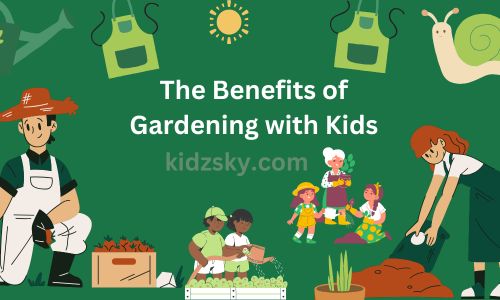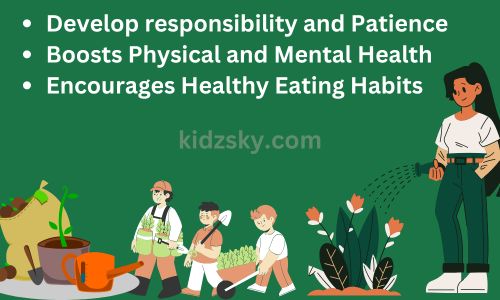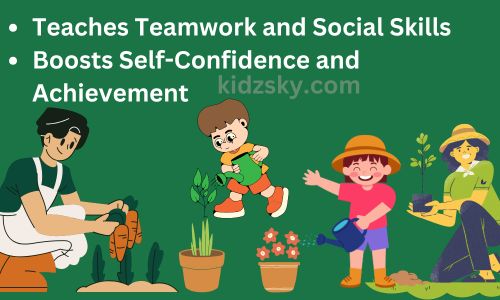Gardening is the best way to help children develop essential skills and values while engaging them with natureThe Benefits of Gardening with Kids can cultivate patience, responsibility, and a love for the outdoors through gardening
Let’s dive into the benefits of gardening with kids, providing activities, examples, and practical insights for parents and educators.

8 Skills & The Benefits of Gardening with Kids
Gardening with kids is a rewarding experience that can spark a lifelong love of natureAs children help plant seeds, water plants, and watch them grow, they develop a sense of responsibility and patience.
Gardening also offers a hands-on learning opportunity, teaching kids about science, math, and nutritionPlus, spending time outdoors in nature has numerous physical and mental health benefits, reducing stress and promoting physical activity.
Whether it’s a small container garden or a backyard plot, gardening with kids is a fun and educational activity that can create lasting memories.
1Develop responsibility and Patience
Gardening requires consistent care and attention, teaching kids responsibility as they learn to water plants, pull weeds, and monitor growthThese activities encourage responsibility by showing kids the long-term rewards of their effortsFor example, a child caring for a sunflower plant learns that neglect leads to wilting, while attention results in blooming.
2Boosts Physical and Mental Health
Spending time in the garden offers fresh air and physical exercise, promoting overall healthGardening involves various physical tasks, like digging, carrying, and planting, that can help children build strength and coordinationBeing outdoors and engaged in nature also positively affects mental health by reducing stress and increasing focus.
Example: Encourage your child to water plants every morning as a daily exercise routineEven simple tasks, like filling and watering, can build physical endurance while creating a refreshing start to the day.
Best With Family:- Creating a Family Reading Corner: 5 Step-by-Step Best Guide

3Encourages Healthy Eating Habits
One of the significant benefits of gardening with kids is the chance to teach healthy eating habitsWhen kids grow their vegetables and fruits, they’re more likely to eat them, leading to a deeper appreciation for nutritious foodsStudies show that children involved in gardening tend to make healthier food choices.
Example: Try a project where kids plant quick-growing vegetables like carrots, radishes, or lettuceWatching them grow can spark curiosity about tasting their homegrown produce!
4Enhances Curiosity and Learning
Gardening is an excellent way for kids to explore biology, ecology, and science hands-onChildren learn about the life cycle, seasons, and the environment’s interconnectedness as they plant seeds, observe sprouting and watch flowers bloom.
Activity Idea: Create a mini garden ecosystem by planting flowers that attract butterflies or herbs that draw beesThis can spark discussions on pollination, plant-animal relationships, and environmental balance.

5Improves Fine Motor Skills
The activities involved in gardening, like holding tools, scooping soil, and planting seeds, help young kids develop fine motor skillsThese repetitive movements can improve hand strength and coordination, which is essential for everyday tasks.
Example: Let young children use child-safe garden tools to practice planting seeds or pulling small weedsThese small tasks encourage motor skill development in a fun and meaningful way.
6Teaches Teamwork and Social Skills
Gardening can be a collaborative activity that involves communication, teamwork, and problem-solvingFamilies and school groups can work together to create a beautiful garden, teaching kids how to share responsibilities, discuss ideas, and celebrate collective accomplishments.
Activity Idea: Organize a family gardening day where each family member has a specific role, like planting, watering, or designingThis encourages cooperation, and in the end, everyone can enjoy the garden they created together.
Check Also:- Teaching Kids About Cultural Habits: 8 Steps & Perfect, e.g.

7Boosts Self-Confidence and Achievement
Watching their plants grow can give kids a sense of pride and accomplishmentKnowing they contributed to the garden’s beauty or harvested vegetables can boost their confidence and encourage them to take on new challenges.
Example: Set a goal for kids to grow a small herb garden with basil, mint, or parsleyOnce the herbs are grown, they can use them in simple dishes, like homemade pizzas or refreshing drinks, making them feel like they’ve accomplished something valuable.

Easy Gardening Activities to Try with Kids
Here are a few engaging gardening activities tailored for kids:
- Windowsill Herb Garden: For limited spaces, plant basil, chives, or mint on a windowsillHerbs increase and can be used in various dishes, giving kids a hands-on experience in the kitchen.
- Seed Starter Kits: Use egg cartons to create mini pots for sprouting seedsWhen ready, transplant them into the garden and let kids monitor their growth.
- Flower Arrangements: Plant colorful flowers like sunflowers, marigolds, or zinnias, which increase and add beautyKids can cut blooms to create flower arrangements for their rooms.
New Blog:- Kids Educational Activities at Home: 10 Perfect for Holidays

The Role of Parents in Supporting Gardening Activities
Parents can support kids in gardening by being active participants and encouraging explorationGardening should be a relaxed, enjoyable experience rather than a choreParents can promote curiosity by asking questions like, “What do you think will happen if we water less?” or “What insects do you see on the flowers?”
Tip: Make gardening a part of the family’s weekly routineDedicate a time for everyone to water, weed, and check on the plants together, reinforcing teamwork and consistency.
You May Like:- Benefits of Learning Multiple Languages for Kids: 8 Best e.g.

Global Perspectives: Gardening as a Universal Activity
Gardening is a worldwide tradition that transcends cultures and brings communities togetherAcross cultures, gardening connects people to the environment and promotes ecological respectTeaching kids gardening imparts a sense of global responsibility and awareness.
Example: Introduce plants from various cultures, like Italian basil, Indian coriander, or Japanese shisoKids can learn about cuisines, customs, and ecosystems, giving them a broader worldview.
Conclusion: Cultivating a Lifelong Love for Nature
We foster more than just a green thumb by engaging kids in gardeningGardening develops lifelong skills, promotes well-being, and encourages environmental awarenessWatching plants grow under their care helps kids understand the importance of nurturing, patience, and responsibilityEmbrace gardening as a family activity and create cherished memories while fostering valuable life skills.
The Benefits of Gardening with Kids are boundless, touching on physical, mental, and emotional growthWith each seed planted and plant nurtured, kids gain more than just a gardening lesson—they learn life lessons that shape their future.
Admin creates all Photos used in this blog in Canva.




[…] Kids Activity:- The Benefits of Gardening with Kids: 7 Skills & Fun Together […]
[…] Kids Activity:- The Benefits of Gardening with Kids: 7 Skills & Fun Together […]
[…] Kids Activity:- The Benefits of Gardening with Kids: 7 Skills & Fun Together […]
[…] Kids Activity:- The Benefits of Gardening with Kids: 7 Skills & Fun Together […]